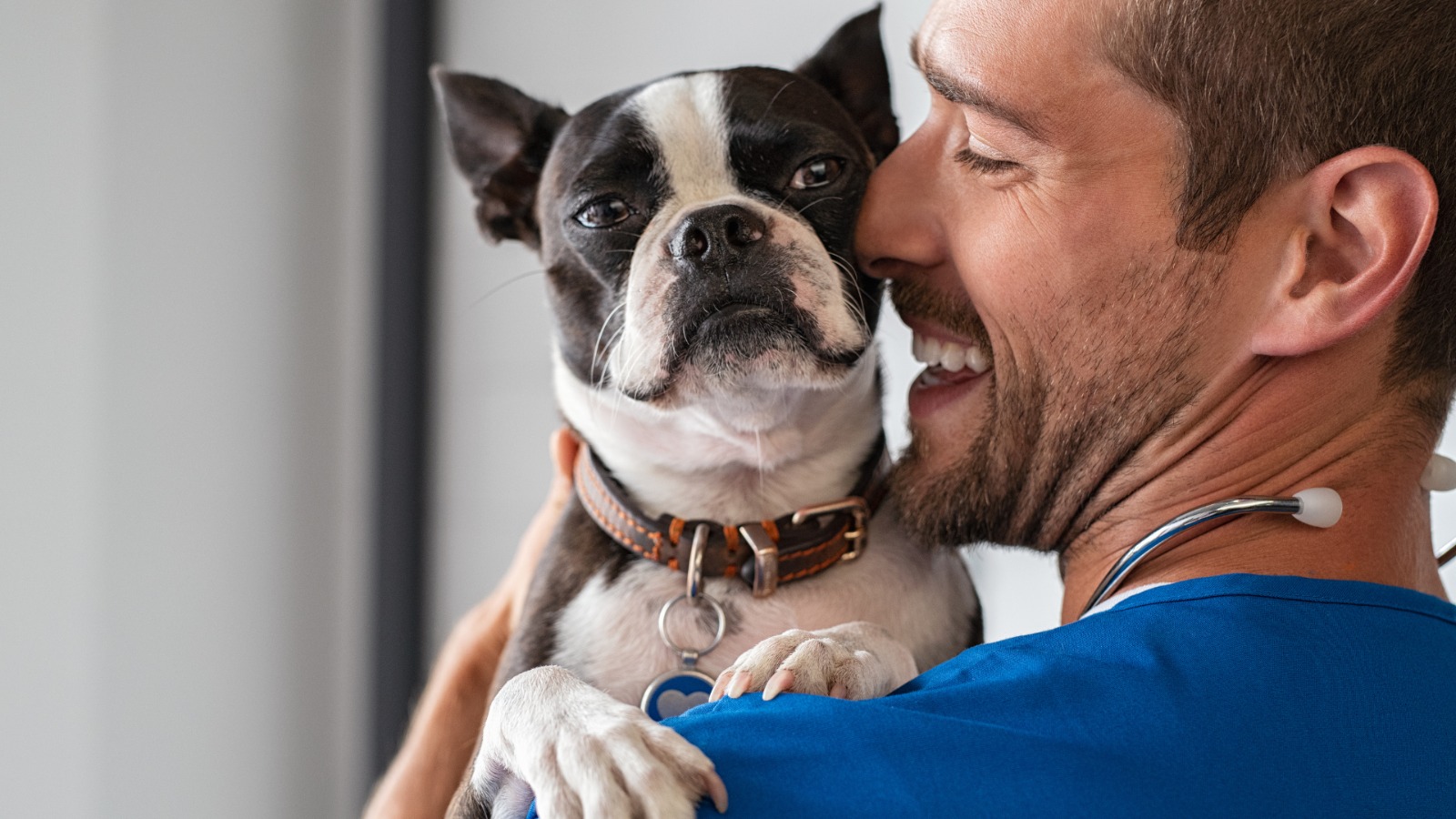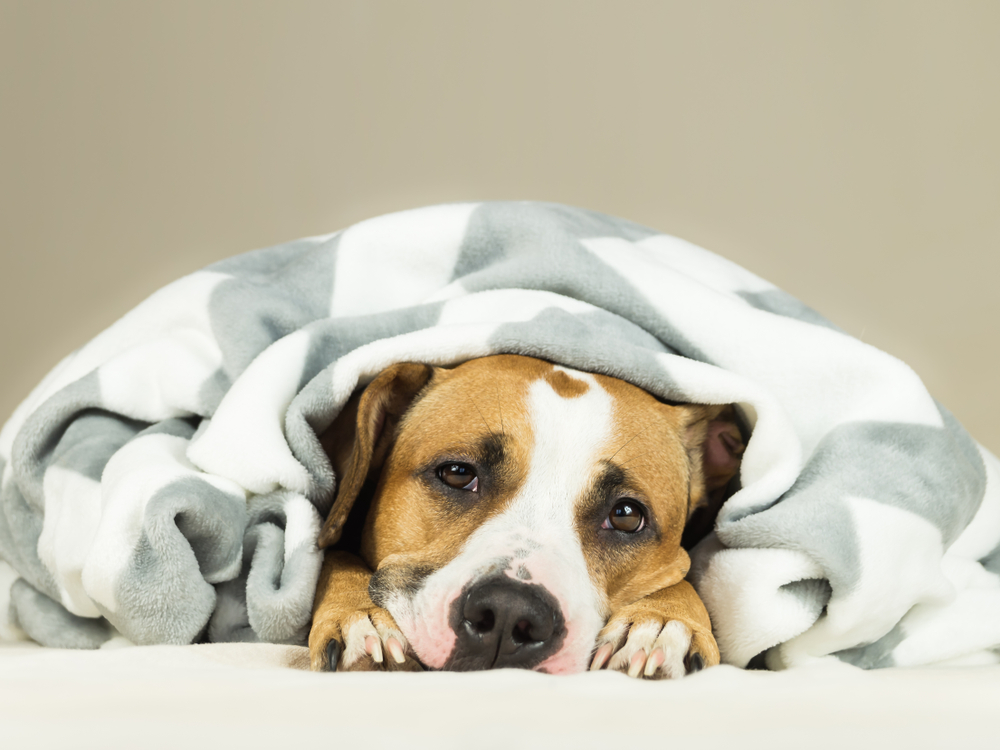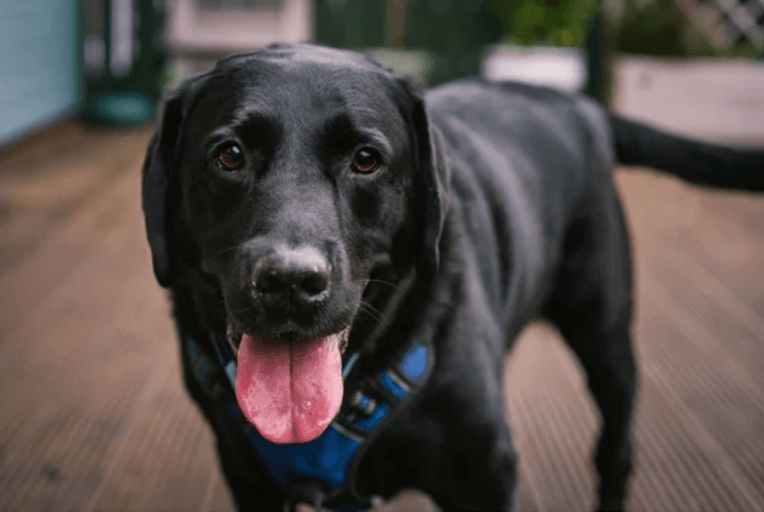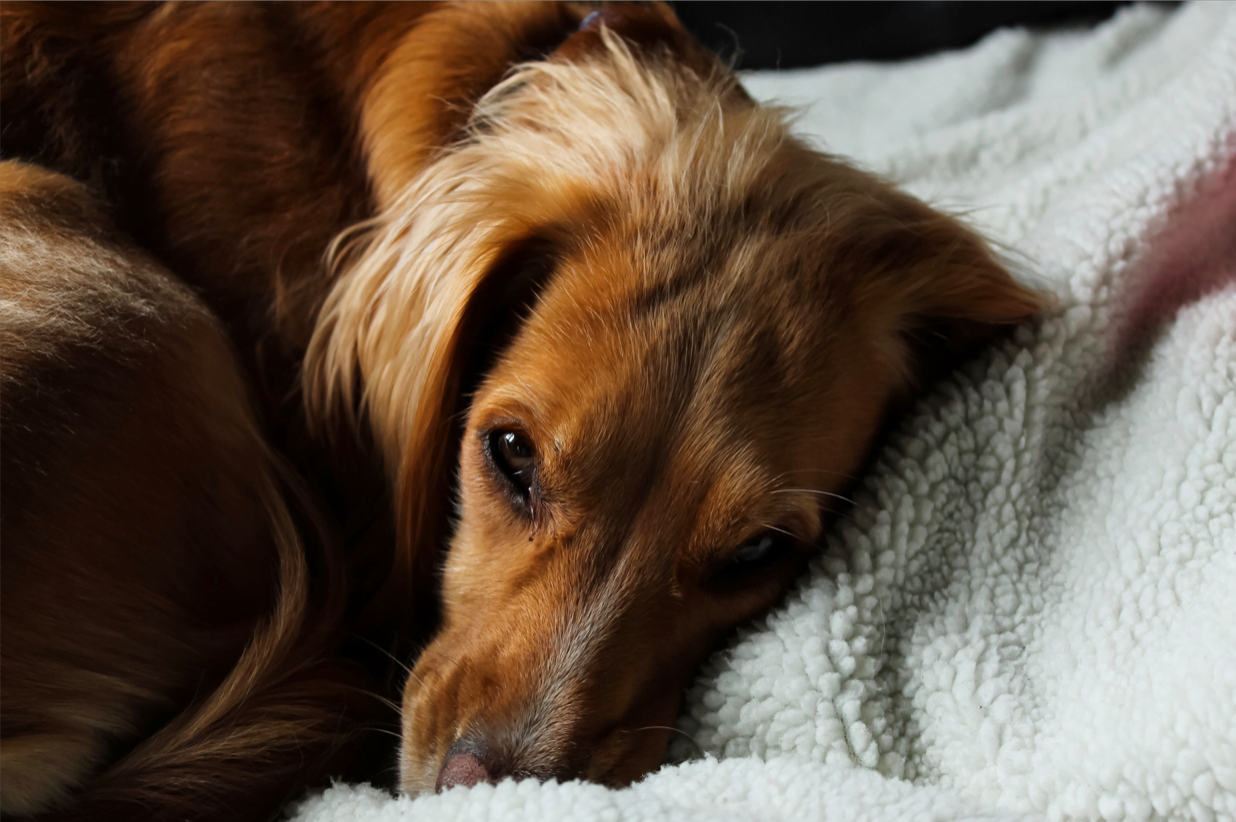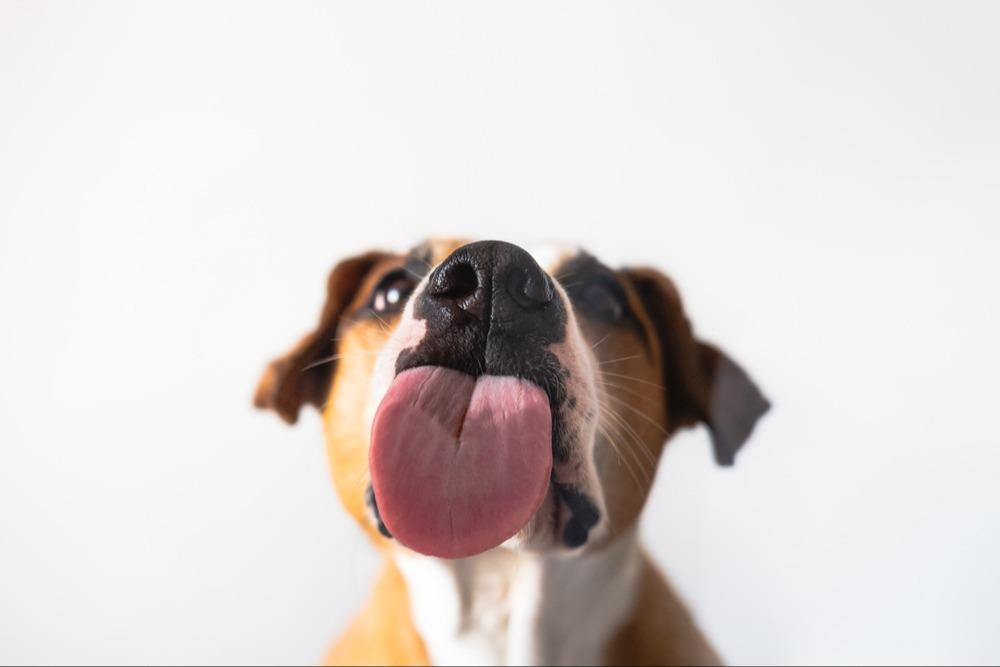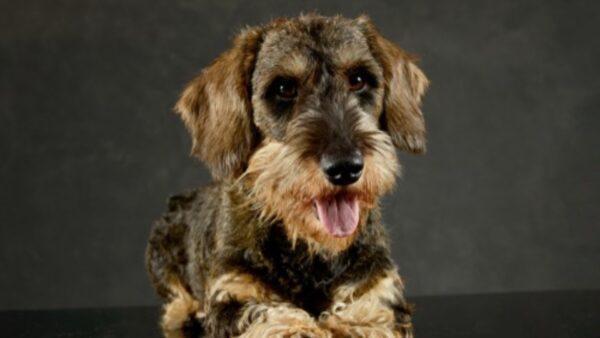
Whether it’s a trail of slobber across your face or you’re sitting in wonder at your dog licking the slate around the fireplace, dogs like to lick. Everything. We find it endearing and a sign of affection when we get a tongue to the ear, or we just assume they’re practicing good hygiene when they are licking their paws.
More often than not, only your dog knows why they are licking that rock in the garden. But there are occasions when there is more to licking behaviour.
Let’s delve into the world of allergies, stress, pain and just good old-fashioned grooming.
If you made a tally of a day in the life of your dog, licking paws would come in pretty high. More often than not, dogs will lick their paws to groom themselves. So, if they’ve come in from their walk or even just from a mooch around the garden, you’ll find them preening themselves and even having a little nibble.
This is generally expected behaviour.
However, this can become excessive if your dog is irritated by something they walk through or on. Grasses, pollens and toxic chemicals can all cause irritation to their sensitive paws. You also run the risk of salt or antifreeze exposure during extreme weather. Not only does this irritate them externally, but through grooming, they ingest it and can cause subsequent damage internally.
It’s always best to rinse your dog’s paws when returning from a walk and give them a towel dry. In extreme climates you can even apply an all-natural paw balm or simply some coconut oil.
Dogs will also lick parts of their body that are painful or stiff; so, if your dog has strained or sprained their leg, they may start licking their paw of the affected leg. Long nails can cause pain too, so check your dog thoroughly if the licking is a new behaviour.
Excessive licking is usually identified by a reddening of the hair on the area being licked, so it’s pretty easy to notice. This is thanks to a protein found in the saliva which stains the hair. It’s not blood, don’t worry.
However, excessive licking can cause trauma to the hair and skin, leaving inflamed, red and sore patches. This is why the underlying issue needs to be tackled as soon as possible.
Some dogs lick people, some dogs don’t. How they have been raised plays a huge part in this. Quite often, if a dog has been allowed to lick their owner, they may lick other humans. If, however, an owner doesn’t want this behaviour, then they will ignore it. The dog won’t get a response and often will cease to do it.
Those of us crazy dog owners who couldn’t care less whose canine slobber we get covered in, usually become jovial, we smile or laugh. The dog, even in the absence of a “food” reward, is receiving positive reinforcement. Dogs can read human emotion and, maybe, if they think we like being licked, they figure it’s just something they should keep doing.
It’s impossible to know for certain why dogs like our faces, but we think it comes from their puppyhood. If you notice how Mum Dogs behave with their puppies, they spend a huge time licking them, grooming them. The great thing is, the more a Mum Dog does this, the more resilient her puppy is as they grow. They are also less reactive to stress. It is believed that this behaviour reduces the amount of stress hormones in the puppy’s body. So, we could argue that our dog licks our face because they are imitating the behaviour they experienced. We could also argue that our dogs do it to help soothe us (do they do it more if we are stressed?)
The less endearing explanation is that actually, as a dog’s sense of smell is so great, they’ve sniffed out a crumb or remnant of food/drink around our mouths and actually just want a taste.
Most will agree, feet are the smelliest part of the human body. In terms of biology, this is pretty accurate. Human feet have more sweat glands per inch than anywhere else on the body. Wearing tight fitting socks and shoes also keeps moisture and heat in, providing a great environment for bacteria to multiply.
Dogs have a great sense of smell, so when there could potentially be a great mixture of water, ammonia, potassium, nicotinic acid, magnesium, chloride, sodium, creatinine, uric acid, ascorbic acid, thiamine and riboflavin (also known as sweat) and then a whole host of different bacteria, why wouldn’t your dog have a lick and see what they could find?
Dog’s explore their world through smell and sight. Maybe they’re just drawn to the smelliest part of the human body? (we’re not saying you have smelly feet, they can just find more information there).
They are more likely, stressed.
Licking is a stress behaviour for canines.
Notice when your dog is licking the air; what is happening in their environment. Is someone touching them? Has someone new come into the home? Are you near their food? Is someone near their toy? Are kids nearby? Have you made a fuss and touched a certain part of their body? This could indicate pain.
It’s important to notice the trigger and also watch for other stress behaviours like; drooling, panting, yawning, pacing, head flicking or turning away from the stressor/trigger. Find the trigger and remove it. Licking is a warning signal; ignorance often leads to escalation.
Like we mentioned above, this is most likely a sign of stress in your dog. It could be secondary to drooling behaviour, but it still shows stress. It’s crucial to find the trigger.
If someone is touching a part of their body that triggers the licking, then get them checked out by a qualified professional as it could be pain related.
Like we’ve mentioned, if your dog is licking furniture there could simply be some leftovers smeared or you’ve closed a cupboard in the middle of prepping dinner. He could just be trying to scavenge.
We’ve explored how Mum’s would have frequently licked their pups to groom and to also soothe them; adult dogs can continue this behaviour for the comfort it brings. It is thought that licking (along with chewing) reduces levels of stress hormones.
This is why, when dogs are suffering with anxiety, if they are offered stuffed kongs or similar to lick, they show a short-term improvement in behaviour, but the underlying issue still remains. Dogs will lick because it helps them feel better; but they still aren’t learning how to deal with the problematic scenario (being left for example).
If dogs learn that licking things makes them feel better, they will continue to do so. We know that dogs learn through the consequences of their behaviour; in short, they’re almost programmed to do what feels good.
You would notice other behaviour alongside excessive licking in an anxious dog including hiding, panting, pacing, frantic behaviour, tail-tucking, avoidance, inappropriate toileting, excessive drooling, trembling and destructive behaviour.
If you are concerned that your dog is struggling with their emotional state, then it’s best to identify potential triggers and remove them immediately.
Dogs seem to seek out wounds instantly and for good reason. Researchers have found growth factors and histatins in saliva which can help with wound repair. Their tongue also removes debris from the wound which reduces the risk of infection. The histatins found in saliva are antimicrobial and antifungal; so, whether he is licking his own or your wounds, he really is trying to keep it free from infection.
As licking also reduces the stress-hormone, it could be a soothing behaviour for the dog if he is in pain too.
Just try to keep the wound as clean as possible; and obviously stop your dog from licking any wound that has been stitched (his or yours). No-one wants another trip to the vet’s for undone stitches!
You could probably answer this on your own now. It’s most likely stress related. Along with yawning, turning away, pacing, drooling, frantic behaviour, hiding and tail-tucking, lip-licking is a very common stress-signal in dogs.
It’s most helpful when watching interactions with people or other dogs. Many dogs will lip-lick if they are feeling uncomfortable around a person or a new dog. They won’t bark, snarl, or growl. This signal is often missed, and unfortunately, they learn that they need to be louder next time. Think of it like a ladder; if one signal is ignored, they jump on up to the next step. This is where you hear “but they did it out of the blue!” No, they didn’t. The subtle signs were missed.
Dogs will lick their lips after they’ve eaten or had a drink, and this is to be expected. But if your dog is lip-licking and they haven’t eaten anything; look at what is going on in their environment. Something is stressing them out and either it or they need to be removed.
Not quite as simple as your dog just wanting to spend the day kissing you; there are many reasons why your dog may lick you, themselves or things in the environment. Take note of what they are licking; could it be irritation, allergies or pain? Or, could it be a sign of stress or anxiety? Licking behaviour is totally normal in some situations; like licking food scraps, grooming or as a form of first aid. But there are times it is suggestive of some other underlying concerns.
If you would like any support with your dog’s health, then please check out our services to see how we can help.
Thanks for reading,
MPN Team
